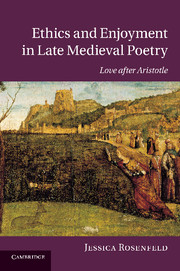Book contents
- Frontmatter
- Contents
- Acknowledgments
- Introduction: love after Aristotle
- 1 Enjoyment: a medieval history
- 2 Narcissus after Aristotle: love and ethics in Le Roman de la Rose
- 3 Metamorphoses of pleasure in the fourteenth-century dit amoureux
- 4 Love's knowledge: fabliau, allegory, and fourteenth-century anti-intellectualism
- 5 On human happiness: Dante, Chaucer, and the felicity of friendship
- Coda: Chaucer's philosophical women
- Notes
- Bibliography
- Index
- CAMBRIDGE STUDIES IN MEDIEVAL LITERATURE
4 - Love's knowledge: fabliau, allegory, and fourteenth-century anti-intellectualism
Published online by Cambridge University Press: 04 February 2011
- Frontmatter
- Contents
- Acknowledgments
- Introduction: love after Aristotle
- 1 Enjoyment: a medieval history
- 2 Narcissus after Aristotle: love and ethics in Le Roman de la Rose
- 3 Metamorphoses of pleasure in the fourteenth-century dit amoureux
- 4 Love's knowledge: fabliau, allegory, and fourteenth-century anti-intellectualism
- 5 On human happiness: Dante, Chaucer, and the felicity of friendship
- Coda: Chaucer's philosophical women
- Notes
- Bibliography
- Index
- CAMBRIDGE STUDIES IN MEDIEVAL LITERATURE
Summary
Historians have traditionally credited the 1277 condemnations of “radically Aristotelian” theses with marking a shift in focus in scholastic philosophy at the close of the thirteenth century. Aristotle's emphasis on contemplation as the highest kind of happiness allowed for occasionally dangerous-seeming claims about the role of the intellect as a privileged faculty of the soul, or the superiority of the life of the philosopher. In the wake of controversies surrounding the “intellectualist” understanding of happiness, theologians debated the emphasis on reason, teleology, and rational pleasure along with the relative roles of the will and the intellect as seats of enjoyment. John Duns Scotus, William Ockham, and other late thirteenth- and early fourteenth-century philosophers made reason the handmaiden of the will, questioned Aristotelian teleology, and continued debates about the nature of enjoyment as the highest good. While there is thus a true “anti-intellectualist” strain in the narrow sense of the intellect as a mental faculty, however, the period is not at all anti-philosophical or anti-Aristotelian. And “independent thinkers” such as Godfrey of Fontaines maintained an opposition to the condemnations of 1277, arguing for the superiority of the intellect over the will. Any resistance to overemphasis on the intellectual faculty may be described more justly as a critique of radical medieval Aristotelians rather than a critique of Aristotle himself.
A theologian directly affected by the condemnations – denied his licentia docendi because of controversial claims in his commentary on the Sentences – Giles of Rome went on directly to produce one of the most influential works of political Aristotelianism, his De Regimine Principum (c.1277–80).
- Type
- Chapter
- Information
- Ethics and Enjoyment in Late Medieval PoetryLove after Aristotle, pp. 107 - 134Publisher: Cambridge University PressPrint publication year: 2010



